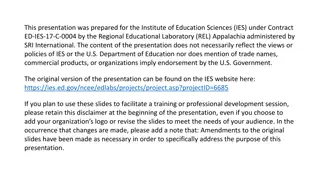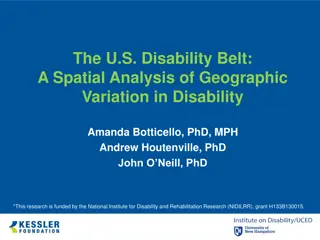Health Literacy in Rural Appalachia: Understanding the Impact and Needs
Health literacy is crucial in rural Appalachia where low literacy levels contribute to poor health outcomes. Understanding, supporting, and improving health literacy among the population can lead to better health decisions and reduced disparities in healthcare access and outcomes. This article explo
1 views • 16 slides
Understanding the Importance of Math Mindsets in Education
This presentation, created for the Institute of Education Sciences (IES) by the Regional Educational Laboratory Appalachia, emphasizes the significant impact of adult attitudes towards math on children's achievement and motivation in the subject. It delves into the concept of fixed versus growth min
0 views • 13 slides
The Rhetoric of Death in Central Appalachia: A Case Study in Rhetorical History
Explore the role of rhetoric in Central Appalachia's material culture through traditional gravestones, studying beliefs and values using artifacts, semiotics, and the evolution of cemetery symbolism over time. Discover how codes on graves convey messages on death and grief within the Appalachian con
0 views • 9 slides
Research Presentation by REL Appalachia for IES Contract
Presentation by REL Appalachia for IES Contract ED-IES-17-C-0004. Prepared by SRI International, focusing on educational research and initiatives in Appalachia.
0 views • 28 slides
Advancing Energy Research in Appalachia through ARIES Initiative
The Appalachian Research Initiative for Environmental Science (ARIES) led by Dr. John R. Craynon emphasizes the importance of science-based approaches in energy projects. ARIES focuses on areas like coal mining, natural gas, electricity generation, and renewables, with a strong emphasis on coal mini
0 views • 44 slides
Geographic Analysis of the U.S. Disability Belt
A spatial analysis of the U.S. Disability Belt, funded by NIDILRR, explores the clustering of disability prevalence in specific regions like Appalachia and the Southeast Coastal Plains. The research aims to understand contextual factors influencing disability distribution and identify high-risk clus
0 views • 20 slides





